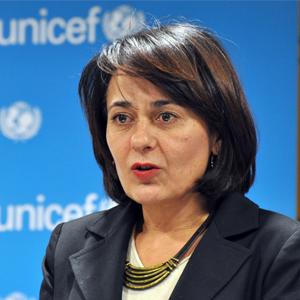Universal Children’s Day: A wake-up call on child rights violations
20 November 2016
Despite enormous progress realized for children since the adoption of the Convention on the Rights of the Child in 1989, the rights of millions of children are being violated every day
Belgrade, Serbia, 20 November 2016 – Despite enormous progress realized for children since the adoption of the Convention on the Rights of the Child in 1989, the rights of millions of children are being violated every day, UNICEF said today as it marked Universal Children’s Day.
“With conflicts, crises, and crushing poverty putting millions of children’s lives and futures at risk, protecting child rights is more urgent than ever – and a critical key to building stronger, more stable societies,” said Michel Saint-Lot, UNICEF Representative in Serbia. “We need to stop these violations by investing more in reaching the most vulnerable children, or pay the price in slower growth, greater inequality, and less stability.”
The former Yugoslavia was among the first countries to sign and ratify the Convention in 1990, and the Republic of Serbia, through succession, has taken upon itself the obligations arising from the Convention. The world’s most rapidly and widely ratified human rights treaty, the CRC sets out a basic, universal standard for a healthy, protected, decent childhood for every human being.
Since ratification, despite the difficulties faced in the last two and a half decades, Serbia has managed to translate many of the legal provisions of the Convention into practice, relying on existing infrastructure, services and professionals in the fields of social welfare, education, and health care available to most children in Serbia.
However, there are still significant obstacles to be overcome in order to ensure that every child can enjoy his or her rights to grow and develop to their full potential. There is insufficient implementation of legal provisions into practice, protection services are not available to all children, there is widespread discriminatory attitudes towards children who do not belong to the majority population, and there is still insufficiently developed and strengthened civil society and an absence of coordination mechanisms between ministries at the national, and institutions at the local level.
In Serbia[1]:
• Children and families with more than two children are the most affected by poverty, 30% of them are at risk of poverty.
• There is a deterioration of the nutritional status among the poorest children, 14% of whom are stunted, while 10% of children under five years old from Roma settlements are underweight.
• Only half of the poorest children aged 6-23 months receive at least 2 milk feeds per day.
• The infant mortality rate among children in Roma settlements is almost twice as high when compared to the national average.
• Only half of Serbia’s children attend any kind of early learning programmes - only 9% of the poorest children and 6% of children from Roma settlements aged 3-5 are attending kindergartens, compared to 82% of children from the richest households.
• 1 in 4 children younger than two years old are physically punished and almost 40% of children aged 10-14 years old are exposed to violent methods of discipline.
• There is still a widespread belief (52% of the population) that it is better for children with physical or sensory disabilities to attend special schools, while 68% of respondents think the same for children with intellectual disabilities.
Despite marked progress for children globally in recent decades, nearly six million children still die every year from preventable causes – and children from poor households are twice as likely as children from wealthier homes to die before reaching their fifth birthdays.
Nearly 50 million children have been uprooted - 28 million of them displaced by conflict. Children trapped in besieged areas – including Syria, Iraq, and northern Nigeria are at greater risk of having their rights violated, with their schools, hospitals and homes under attack. Globally, around 250 million live in countries affected by conflict.
Almost 385 million children live in extreme poverty and over a quarter of a billion school-aged children are not learning. Nearly 300 million children live in areas with the most toxic levels of outdoor air pollution – six or more times higher than international guidelines.
Next month UNICEF will mark 70 years of working to bring life-saving aid, long-term support and hope to children whose lives and futures are endangered by conflict, crises, poverty, inequality and discrimination. To mark the occasion, UNICEF in Serbia is organizing a Telethon, with Prva Television, to showcase UNICEF’s work in the country and to raise funds for programmes that UNICEF is implementing for the children of Serbia.
“Every child has the right to grow up healthy and strong, to be educated and protected, and to have a fair chance in life,” said Michel Saint-Lot. “Our commitment to child rights must be matched with action for every child."
____________________
[1] The Serbia Multiple Indicator Cluster Survey (MICS 5) and 2014 Serbia Roma Settlements Multiple Indicator Cluster: http://webrzs.stat.gov.rs/WebSite/Public/PageView.aspx?pKey=535





